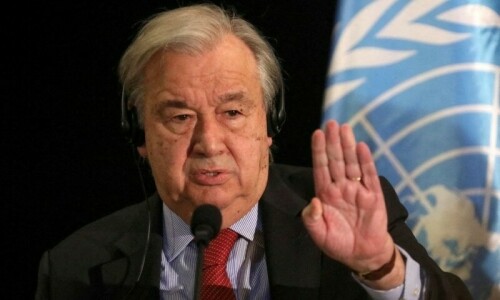
• NSC meeting stresses engagement to address concerns; cabinet endorses body’s decisions
• FMs agree to strengthen coordination to combat terrorism, discuss reappointment of ambassadors
• Iran conducts large-scale air defence drill employing drones to intercept hostile targets; Russia urges restraint
ISLAMABAD: The National Security Committee (NSC), the country’s premier authority on security and foreign policy, on Friday ratified the move towards reducing tensions between Pakistan and Iran and underscored a commitment to addressing mutual security concerns.
The NSC’s meeting was convened to deliberate on the latest escalation with Iran following its cross-border strikes and Pakistan’s retaliatory attack.
Caretaker Prime Minister Anwaarul Haq Kakar chaired the session, which was attended by caretaker ministers of defence, foreign affairs, finance, and information. The chairman of the Joint Chiefs of Staff Committee and the chiefs of the Army, Navy, and Air Staff, along with the heads of intelligence agencies, also participated in the meeting.
“The forum (NSC) expressed that Iran is a neighbourly and brotherly Muslim country, and existing multiple communication channels between the two countries should be mutually utilised to address each other’s security concerns in the larger interest of regional peace and stability,” said a statement issued by the prime minister’s office after the meeting.
The statement marked a dramatic shift from heightened tensions earlier in the week, where both countries engaged in cross-border strikes and downgraded diplomatic relations. It laid the ground for opening a potential pathway towards renewed dialogue and diplomatic engagement.
The NSC hoped that both countries “would mutually be able to overcome minor irritants through dialogue and diplomacy and pave the way to further deepen their historic relations”.
The committee also reviewed border conditions and the readiness to effectively counter any future infringements on national sovereignty.
It emphasised that any violation, under any pretext, would be met with the state’s full force. It should be recalled that the first moves to de-escalation were witnessed hours after Pakistan executed retaliatory strikes against militant targets in what NSC described as “ungoverned space” in Iran, where Pakistan-origin Baloch militants were residing.

Cabinet briefed
Later, during the cabinet meeting, Prime Minister Kakar stressed that it would be beneficial for both Pakistan and Iran to work towards restoring their relationship to its pre-Jan 16 state. He said Pakistan was open to and would respond positively to any constructive initiatives from Iran. The cabinet, which met soon after the NSC’s meeting, also endorsed the committee’s decisions.
According to the prime minister’s office, the Ministry of Foreign Affairs briefed the caretaker federal cabinet about the situation arising from the Iranian attack. The cabinet appreciated the armed forces’ response to the breach of Pakistan’s sovereignty.
“Pakistan is a law-abiding and peace-loving country and seeks friendly and cooperative relations with all countries, particularly its neighbours,” the premier told the participants.
De-escalation moves
Nine people were killed in Pakistan’s attacks carried out by multiple weapon systems under an operation named ‘Marg Bar Sarmachar’.
First, Foreign Office spokeswoman Mumtaz Zahra Baloch in her media briefing on Thursday said Pakistan did not want to escalate the situation and that it believed in dialogue and cooperation for confronting common challenges, including the menace of terrorism.
Her statement was soon followed by a similar conciliatory gesture from the military. “Going forward, dialogue and cooperation is deemed prudent in resolving bilateral issues between the two neighbouring brotherly countries,” the ISPR said.
That sentiment was reciprocated by Iran, whose foreign ministry, in a late evening statement, said Iran “adheres to the policy of good neighbourliness and brotherhood between the two nations and the two governments”.
Foreign ministers’ conversation
These exchanges set the stage for a phone conversation between Caretaker Foreign Minister Jalil Abbas Jilani and his Iranian counterpart Hossein Amir Abdollahian on Friday.
The two foreign ministers underscored the importance of collaboration and synchronising efforts at the operational level, with a specific focus on counterterrorism and other mutual concerns. They also committed to de-escalate tensions.
Diplomats briefed on the conversation said it was marked by a positive and constructive tone from both sides.
Mr Jilani expressed surprise over Iran’s strike on Jan 16, citing the strong engagement and trust that has historically characterised the bilateral relations.
He recalled Pakistan’s repeated requests to Iran to present tangible proof backing its allegations of terrorist factions operating from Pakistani soil.
Earlier, during their phone call on Jan 2, Mr Jilani had reassured Iran of Pakistan’s unwavering commitment to jointly combat terrorism.
Speaking about Pakistan’s counterstrike, he said Islamabad had shared intelligence reports with Tehran on multiple occasions regarding militants’ sanctuaries within Iranian borders.
Furthermore, the two foreign ministers deliberated on the reappointment of each country’s ambassadors to their respective capitals, signalling a move towards restoring diplomatic normalcy.
Mr Jilani, the Iranian foreign ministry said, invited Mr Amirabdollahian to visit Islamabad.
The Iranian foreign minister, according to the Iranian side, emphasised that the assurances about security and military cooperation should be seriously pursued.
Russia calls for restraint
Russia has also urged restraint. Kremlin spokesman Dmitry Peskov said on Friday the escalation between Pakistan and Iran was cause for concern and was partly a consequence of the Gaza crisis. He said Russia was maintaining contacts with both sides through diplomatic channels.
Iranian drills
Meanwhile, Iran undertook a large-scale air defence drill employing drones to intercept hostile targets.
The exercise, covering a vast area from Abadan in the southwestern Khuzestan province to Chahbahar in Sistan-Baluchestan, began on Thursday.
The two-day drills, named “Defenders of Velayat Skies 1402,” involve the Khordad-3 air defence system, a domestically produced technology by the Aerospace Force of the Islamic Revolution Guards Corps (IRGC).
The air drills involved various military branches, including the army’s air defence force, the IRGC’s Aerospace Force, the air force, the navies of both the Islamic Republic and the IRGC, and the army’s ground force divisions.
Syed Irfan Raza also contributed to this report
Published in Dawn, January 20th, 2024













































Dear visitor, the comments section is undergoing an overhaul and will return soon.